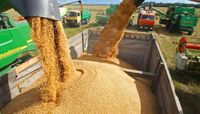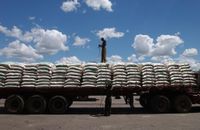In a recent development that could have significant repercussions for the wheat supply to Morocco, Russian health officials announced a suspension on a shipment of wheat bound for the North African nation. This action was taken after the discovery of agricultural pests within the consignment, leading to widespread speculation about the impact on future imports from Russia, one of the world’s leading suppliers of wheat to Morocco.
The reports from various sources indicate that the situation may not be as dire as initially portrayed. A responsible source from Russia clarified that the supposed export ban applies only to a single shipment of wheat, specifically between 25 and 30 tons. These details were reported by the electronic newspaper Madar21, which emphasized that the information circulating online lacked context and contained incomplete data.
According to this Russian source, the transfer of the wheat shipment was hindered by routine pre-emptive analyses. These analyses revealed the presence of certain pests that had not previously been associated with health risks in Russia but were nonetheless prohibited in several countries, including Morocco. As such, the shipment from Chelyabinsk was halted before it reached its destination.
“Even if the shipment had arrived in Morocco and underwent tests by the National Office for Food Safety (ONSSA), Moroccan importers would have rejected it, as it would have violated the conditions stipulated in the import specifications,” the source noted, further clarifying the local standards governing agricultural imports.
The concerns surrounding this incident intensified as Morocco is one of the top ten importers of Russian wheat, especially since the two nations recently signed a memorandum of understanding on November 29, 2024, aimed at facilitating the export of grains to the Moroccan market. This memorandum reflects the growing trade relations between the countries, particularly in the agricultural sector.
Eduard Zernin, the head of the Union of Grain Exporters in Russia, stated that Moscow has plans to export around one million tons of wheat to Morocco during the 2024-2025 agricultural season. He expressed ambition for future increases, aiming to raise exports to 1.5 million tons. Such plans indicate a robust partnership and a high level of interdependence between the two nations.
However, this most recent incident raises alarms among professionals in the agricultural sector in Morocco, particularly in light of climatic fluctuations that have affected local wheat production. The reliance on imported wheat to meet domestic needs makes this situation more precarious, as any disruption in supply could lead to price hikes and potential market instability.
The implications of this development extend beyond just this one shipment. A source emphasized that there have been over 83 warnings sent to the Chelyabinsk region last year concerning compliance with trade standards. Interestingly, this situation has not hindered the overall import process from Russia, which remains smooth, with significant quantities of wheat continuing to arrive in Morocco. “Importing from Russia is proceeding in a normal and smooth manner,” the source affirmed, highlighting the continuity of trade between the two nations despite the specific anomaly.
During the first two months of this year, total wheat imports from Russia to Morocco reached 124,000 tons, marking a dramatic increase of 130% from 54,300 tons in the same period last year. This increase demonstrates the mutual trust established between Morocco and Russia, helping the latter secure its position as the second-largest supplier of soft wheat to Morocco after France.
This position is noteworthy, considering that Russia exported 10 million quintals of soft wheat to Morocco in 2024, outpacing Germany's nearly 5.7 million quintals, while Romania and Ukraine also accounted for sizable exports to the North African nation.
With such heavy reliance on wheat imports, it remains crucial for Moroccan importers and policymakers to navigate these changing dynamics carefully. Continuous dialogue and engagement with Russia will be essential in mitigating risks associated with pests and ensuring a stable wheat supply for the nation.
As the situation develops, stakeholders in Morocco will be watching closely, hoping for a swift resolution that allows for the continued import of Russian wheat without further disruptions. The partnership between Morocco and Russia in the wheat sector could serve as a model for future agricultural collaborations, provided both parties can address the underlying challenges effectively.





